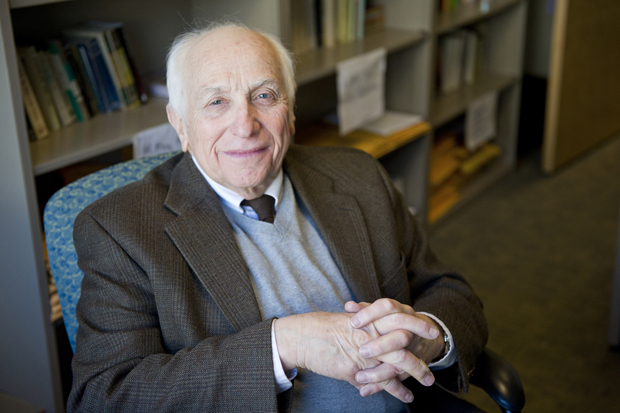Professor’s play revisits 1936 ‘Nazi Olympics’

English professor Sam Bernstein co-wrote “Olympics Über Alles,” which focuses on two Jewish-American athletes barred from competition in the 1936 Olympics in Berlin. Photo by Mary Knox Merrill.
Playwright Sam Bernstein could not shake what he had learned by reading about the so-called “Nazi Olympics,” which took place in Berlin in 1936.
The Northeastern English professor thought about Avery Brundage, the American official and future head of the U.S. Olympic Committee who worked with a global coalition of leaders to hold the games in Berlin despite the Nazi oppression of Jews and other “less than wholesome” people at that time.
He thought about Jesse Owens, the African American track and field star whose four gold medals thwarted the aspirations of Adolf Hitler, who wanted the Games to showcase German nationalism and the strength of the Aryan race.
But more than anything, Bernstein could not stop thinking about two of Owens’ teammates — Marty Glickman and Sam Stoller — “two Jewish boys” who, he said, qualified for the U.S. Olympic track team but were not allowed to participate in the Games.
At the suggestion of his wife and in collaboration with former student Marguerite Krupp, Bernstein began researching and writing. Two years later, Krupp and Bernstein completed “Olympics Über Alles,” a sprawling play that spans history and crosses continents.
The play — which was first produced in 2005 as a four-and-a-half-hour staged reading sponsored by Boston University — is set both at the 1936 Games and in a modern time, when a male Jewish professor and a female Catholic museum curator are examining the Berlin Olympics in consideration of a proposed museum exhibit pertaining to those games.
“At first, these two people are at odds about many matters,” Bernstein said. “But as they come to understand each other’s background, their capacity to appreciate each other and their values comes into play.”
After the 2005 staged reading, the play sat dormant. Then, director Eric P. Vitale, who had staged a previous work by Bernstein, agreed to stage a full production of the play, which will open later this month at MIT’s Kresge Little Theatre.
Bernstein revised the play, cutting about two hours from the original running time. He has worked closely with its actors, who each play several characters during the performance, which addresses sports, religion, relationships and the seeds of World War II.
“I hope the play, with its central historical, humanistic and romantic discussions, is broadly appealing,” Bernstein said.
“Olympics Über Alles” will be performed at 8 p.m. on Feb. 10, 11, 17 and 18, and at 3 p.m. on Feb. 12 and 19. Tickets are $20 and can be purchased in advance at tickets.neu.edu.




